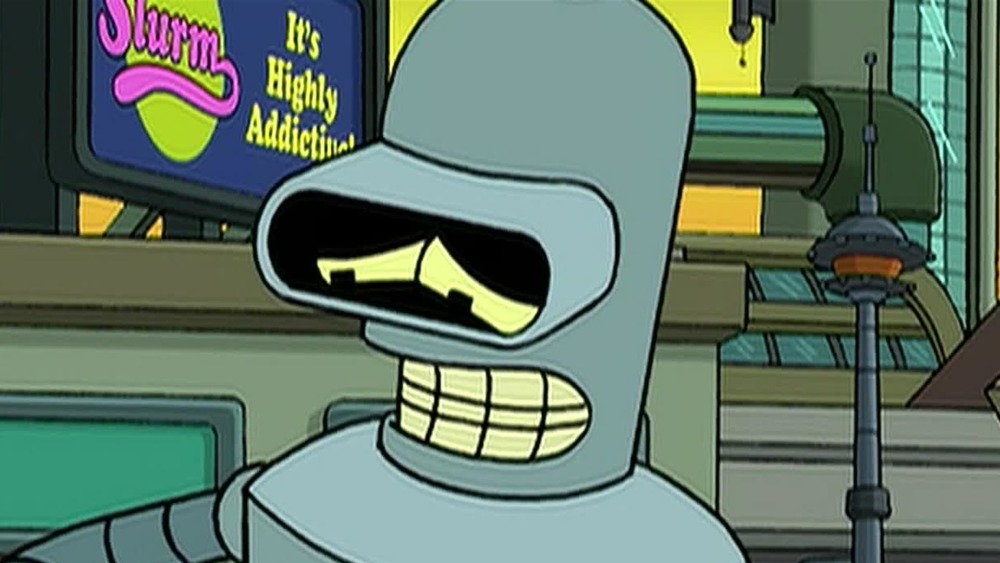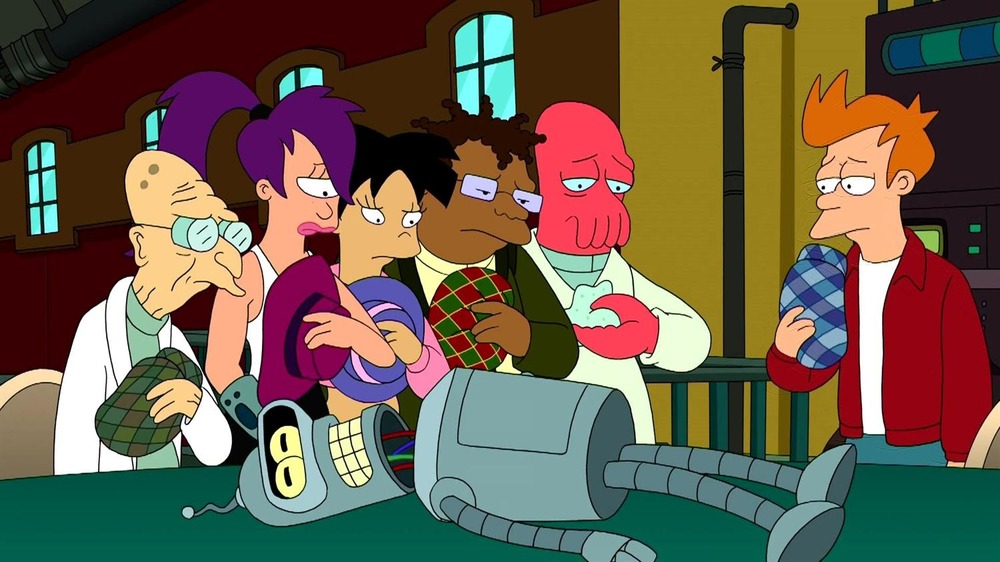Only Hardcore Futurama Fans Know About Bender's Biggest Weakness
Among Futurama's cast of loveable ne'er-do-wells there is perhaps no character quite as popular as Bender Bending Rodriguez, the drunken criminal robot of the Planet Express Crew. Bender has been around since episode one, is the only character with two movies named after him, and is featured in much of the show's promotional material. Alongside Fry and Leela, he is one of Futurama's three main characters.
Despite the fact that Bender is a life-loving narcissist, the first thing viewers ever see him do is enter a "suicide booth." Ignoring the morally dubious circumstances that entail legal, streetside suicide in a civilized society, this is an oddly anachronistic course of action for Bender. It's not the first time that Bender would try to kill himself (nor would it be the last), but it's anyone's guess as to whether that means anything. Bender's vulnerability to damage changes more than the seasons, so it's a mystery whether a conventional suicide booth would even do anything to him.
As you'll soon discover, though, Bender isn't impervious to all damage.
What makes Bender seem invincible
In many episodes it seems like Bender is simply immortal. He certainly can't die of old age. After abusing a one-way time travel system during the events of Bender's Big Score, Bender is likely hundreds of thousands (if not millions) of years old. He's also been burnt to ash, crushed flat, and riddled with bullet holes without dying even a little bit. In "War is the H-Word," Bender jumped on an explosive large enough to kill multiple people and still only ended up in the hospital for a short time.
Technically, Bender does die in the first episode of Season 6 after the Planet Express ship crashes headfirst into Earth. However, he is shortly resurrected by the Professor. When he returns, his power source is incredibly weak, so the Professor replaces it with one of his doomsday devices. This supplies Bender with too much power and he is forced to continuously dance lest the device goes off and kills everyone. Eventually, Bender refuses to dance any longer and is swallowed by a giant monster before the device goes off. When it does explode (killing the monster in the process), Bender emerges from its corpse saying "what does it take to kill me?"
Where Bender is vulnerable
All of this durability is contradicted, however, by the many times in which Bender fears for his own life, is assured of his mortality, or just straight up dies. In the episode "Lethal Inspection," Bender reveals that most robots have backup copies of their bodies. Should a robot meet an untimely end, their consciousness will download into their new body. Unfortunately, Bender also learns that he is a defect that lacks this backup copy. The rest of the episode focuses on him coming to terms with his own mortality. Without a doubt, this is Bender's greatest weakness.
But this may not matter much in reality. After all, robots canonically have an afterlife in Futurama's universe. Just 13 episodes after Bender learns that he is a defect, he has another go with his local suicide booth. In an odd turn of events, the suicide booth turns out to be one of Bender's ex-girlfriends. What would've been Bender killing himself soon turns into a murder, and he departs the mortal plane only to become a digital ghost. Apparently robots get to exist as a non-physical consciousness even if they don't have a backup body. While these events prove that Bender can actually die, they also reinforce the idea that death has no meaning for a robot.
If you or someone you know is having suicidal thoughts, please call the National Suicide Prevention Lifeline at 1-800-273-TALK (8255) or text HOME to the Crisis Text Line at 741741.


